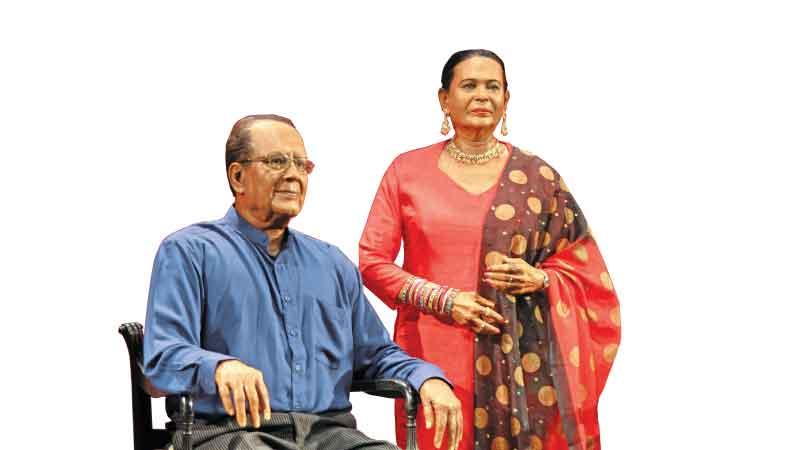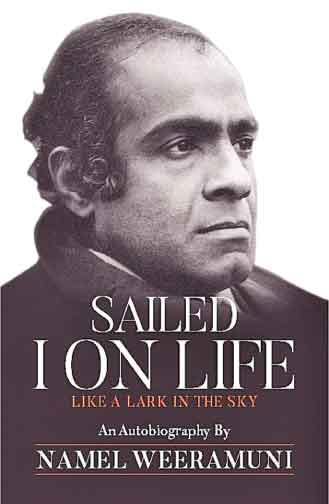
Veteran play writer, producer, director, actor and author Namel Weeramuni launched his autobiography, SAILED I ON LIFE LIKE A LARK IN THE SKY recently. Weeramuni who has over sixty years’ experience in stage and the literary arena, spoke to the Sunday Observer about his autobiography, his life and the honorary Doctor of Philosophy (Ph.D.) award he received from the Kelaniya University a few weeks back.
Excerpts:
Q. First, let me wish you for the Doctorate award you received.?
A. Thank you. It’s an honorary title given to me for the work I have done in the field of theatre. This is similar to the Doctorate that Henry Jayasena and Tissa Abesekara were awarded. It’s a great honour to me to receive such an award.
Q. Speaking about your autobiography, SAILED I ON LIFE LIKE A LARK IN THE SKY what motivated you to write this book?
A. This is the life that I’ve always had and thought it would be good to write about it. I wrote the book in response to my grandson, Noah Namel’s request. Noah wished to know his ancestral story as he is a blend of a New Zealand mother and Sri Lankan father, who lived in a different environment to his grandfather’s. When I began to write the book I was in New Zealand and when I came to its end seven or eight years later I was here in Sri Lanka.
However, there is another person who motivated me immensely in this endeavour.
He is Nandasiri (Nandi) Jasentuliyana, former Deputy Director General of the United Nations Organization. He published his autobiography in 2014 and that helped me to write mine, as he constantly insisted that I start my journey of writing when I was hesitant to do so.
Q. SAILED I ON LIFE LIKE A LARK IN THE SKY comprises short narratives that remind me about stories of Ruskin Bond, the famous British – Indian short story writer?
A. I haven’t read his books, but yes, the book comprises short narratives. These are my life’s experiences, so it was easy to write them in the form of short narratives, and you can call it an autobiographical novel too. My whole life story is in it. In my view an autobiography is a narration. I have read some famous autobiographies such as those of Bertrand Russel, George Bernard Shaw and Lawrence Olivier.
Q. In your biography you describe some moving events in your life. For instance, the book starts with how you lose your elder sister who you had never got to know?
A. Yes. The book starts with that incident. It’s a very sad situation and when the Sinhala translator of the book suggested a title such as, Ma nodutu Akka (The sister I never saw) to describe that situation, I corrected him No. It is Ma nodath Akka (The sister I never knew). Really my sister was a cute, pleasant girl as my mother would constantly refer to her. In that particular moment when I was still an infant, my akka had slapped my buttocks thrice and said in a high pitched voice, “I am not angry with mother, father, or brother” (Ammi ekka tharaha ne, Thattha ekka tharaha ne, malli ekka tharaha ne), and thereafter ended her life.That was how she had ended her bond with her loved ones, according to my mother. It’s a very sad experience.
There are many moving incidents in the book, the main reason being that my life was not a cozy one at the beginning. I was born and grew up in the seaside village of Balapitiya where people had to work hard to earn a living. My father had a shop in the Balapitiya town that sold raw rubber, and he was the sole bread winner of the family. Making the situation worse, my father died when I was just four years and mother died when I was fifteen or sixteen. Thereafter, I was orphaned, and my two uncles shared the responsibility to help me complete my education.
Q. You were in your 80th year or so when you started to write this book. How do you have such a sharp memory to describe every single event in your early life so vividly?
A. I am an all’ time reader. For a person who is an avid reader and grasps things, it automatically comes to mind. Every good reader or writer has a sharp memory.
Q. Prof. Sarachchandra was one such writer who has a very good memory. He describes subtle things of his past in his cultural autobiography, Pin Athi Sarasavi Waramak Denne?
A. Sarachchandra was indeed a very good writer, and naturally he has a sharp memory. Memory is important for an artist, without which no art can be created, as art is a combination of facts and imagination.
Q. When compared to your childhood, what is lacking in the new generation?
A. I grew up in a completely different environment where there was no electricity, no modern facilities and without parents.
I lead a different life and you cannot compare it with today’s childhood. However, today, children do not read books. They are not interested in reading. Books were part of our life those days and we pursued knowledge through books. So if something is lost in the new generation, it is because of this non reading habit.
Q. Meeting Dr. Sarachchandra was a turning point in your life, as he was the one who introduced you to the world of theatre?
A. I believe I had the talent for theatre, but it was a hidden talent. It was Dr. Sarachchandra who got me interested and put me into acting. He gave me a memorable character in his play Rattaran, in 1959 when it was produced in the University of Peradeniya. After that I gained the confidence and the energy for theatre and could embark on the theatrical world as a lifetime profession.
Here I should mention three names that were instrumental in my theatrical career. One is Dr. Sarachchandra who put me into acting. Second is Prof. Ranjani Obesekara who encouraged me in Direction and the third is Prof. Wimal Dissanayake who encouraged me to write for theatre as he himself wrote a play for me which I produced as Golu Birinda at the second year of University in 1959.
Of course, Dr. Sarachachandra was a huge influence in my life. After I acted in his play, I felt there was nothing I couldn’t do in theatre. I never turned back. I gained confidence in all theatrical roles such as acting, directing and script writing.
Dr. Sarachchandra also directed me to practise fiction writing. Those days at the Peradeniya University there was an extra class called Nirmana Panthiya on Fridays after the usual tutorial classes conducted by Sarachchandra to give some knowledge about fiction and poetry writing.
In that class he selected poems or short stories written by the students and analysed them to give a comprehension about their literary work. For the Nirmana Panthiya I wrote a short story called Atharamaga (On the way).Sarachchandra selected it to review in the class, for which I eventually ended up winning the Gold Medal for that year in the University.
Hence, Dr. Sarachchandra is my literary giant who introduced me to literature. He never taught us, but only indicated. He didn’t give us notes or handouts in his tutorial class at the university. Instead he instilled in our minds what we learnt from him.
Q. Dr. Colvin R. De Silva is also an important figure for you?
A. Absolutely. At the university we once invited him to speak on education, where he made an important point. He said, “When we join the university, we think we know everything.
In the second year, you begin to think you know only a quarter of the thing. In the third year you think, you don’t know half of the thing. In the fourth year you begin to think you don’t know three quarters of it.
When you get out of the university you begin to think you don’t know anything.” Dr. Colvin R. De Silva, in this way pointed out that Education is knowing what you don’t know. If you don’t know anything, you go after knowledge. That’s what he explained. So he is also my mentor.
Q. Now looking back on your life, at the age of 86, are you satisfied about yourself?
A. Yes. I feel I have had a very good life. I received most of the things I wanted. And here I must thank my dear wife, Malini Weeramuni who looked after me and made me what I am. We still love each other. Love is more important than anything else in life.
SAILED I ON LIFE LIKE A LARK IN THE SKY published by Sarasavi Publishers.
